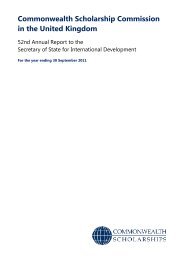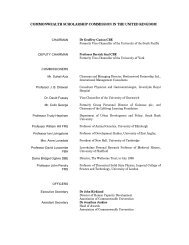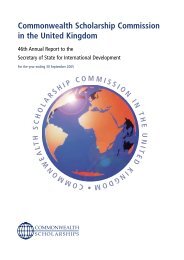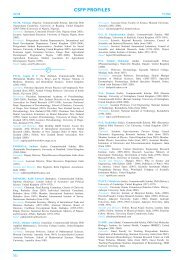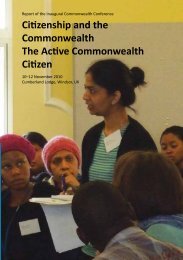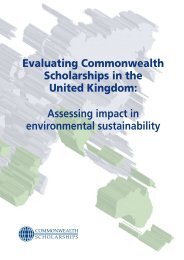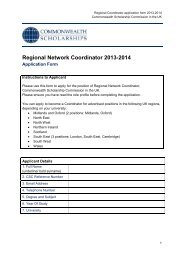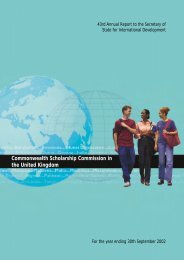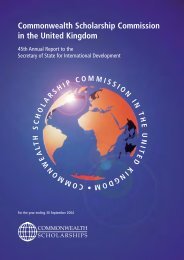CommonGround - Commonwealth Scholarship Commission in the ...
CommonGround - Commonwealth Scholarship Commission in the ...
CommonGround - Commonwealth Scholarship Commission in the ...
- No tags were found...
Create successful ePaper yourself
Turn your PDF publications into a flip-book with our unique Google optimized e-Paper software.
Orig<strong>in</strong>sEmpire rootsThe <strong>Commonwealth</strong> is <strong>the</strong> world’soldest political association of sovereignstates. Its roots go back to <strong>the</strong> BritishEmpire, which once covered a quarterof <strong>the</strong> world’s land area, and <strong>in</strong>cludedabout <strong>the</strong> same proportion of <strong>the</strong>world’s population.How did <strong>the</strong>Empire develop?Unlike many previous empires, <strong>the</strong>British Empire was not created byconquest, although military support didplay an important part. Instead, it grewhaphazardly, <strong>in</strong> piecemeal fashion, from<strong>the</strong> sixteenth to <strong>the</strong> n<strong>in</strong>eteenth century.It was driven by a number of factors,listed below, and <strong>in</strong>volved <strong>the</strong>settlement and control of lands <strong>in</strong>Africa, India, North America, South EastAsia, and <strong>the</strong> Caribbean.Trade ● The British government’s rule<strong>in</strong> India orig<strong>in</strong>ally developed from <strong>the</strong>activities of merchants, trad<strong>in</strong>g ma<strong>in</strong>ly <strong>in</strong>cotton, silk and tea. Trade also formed<strong>the</strong> basis of what became British control<strong>in</strong> South East Asian states, <strong>in</strong>clud<strong>in</strong>gHong Kong, Malaya and Borneo.Piracy ● The British presence <strong>in</strong> <strong>the</strong>Caribbean and sou<strong>the</strong>rn parts of <strong>the</strong>United States was <strong>in</strong>itially prompted bypiracy and an opportunity to establishga<strong>in</strong>s over rival Spanish and Portugueseempires. In time, this led toestablishment of plantations grow<strong>in</strong>gsugar and tobacco and <strong>the</strong> extensive<strong>in</strong>volvement of Brita<strong>in</strong> <strong>in</strong> <strong>the</strong> slave tradewith West and Central Africa.Settlement and exploration ●Settlement was an important driv<strong>in</strong>gforce <strong>in</strong> <strong>the</strong> expansion of <strong>the</strong> Empire.In <strong>the</strong> 1620s, pilgrims left England toestablish a new social and religiousorder <strong>in</strong> America; <strong>the</strong> early colonisationof Australia was partly a result ofBrita<strong>in</strong>’s policy of sentenc<strong>in</strong>g largenumbers of convicts to compulsorytransportation; and millions, <strong>in</strong> <strong>the</strong>n<strong>in</strong>eteenth century, settled <strong>in</strong> NorthAmerica, Australia and New Zealand toescape from poverty <strong>in</strong> Brita<strong>in</strong>.Britons were also prom<strong>in</strong>ent, dur<strong>in</strong>g<strong>the</strong> n<strong>in</strong>eteenth century, <strong>in</strong> explor<strong>in</strong>g <strong>the</strong><strong>in</strong>terior of Africa – search<strong>in</strong>g for m<strong>in</strong>eralwealth and markets for goods, andseek<strong>in</strong>g to spread Christianity. Although<strong>the</strong>se areas had long-established<strong>in</strong>digenous populations, Brita<strong>in</strong> claimed<strong>the</strong> lands as its own.War ● In <strong>the</strong> late eighteenth and earlyn<strong>in</strong>eteenth centuries, Brita<strong>in</strong>’s victory <strong>in</strong><strong>the</strong> Napoleonic War aga<strong>in</strong>st Franceadded fur<strong>the</strong>r countries to <strong>the</strong> Empire,<strong>in</strong>clud<strong>in</strong>g Mauritius, Sri Lanka (<strong>the</strong>nknown as Ceylon), Tr<strong>in</strong>idad and Tobago,St Lucia and Malta.At <strong>the</strong> end of <strong>the</strong> First World War, anumber of German colonies <strong>in</strong> Africaalso became part of <strong>the</strong> British Empire,as reparations. These <strong>in</strong>cluded parts orall of <strong>the</strong> states today known asCameroon and Tanzania.Power and controlThe ma<strong>in</strong> motive beh<strong>in</strong>d <strong>the</strong>establishment and expansion of <strong>the</strong>Empire was to <strong>in</strong>crease Brita<strong>in</strong>’s wealthand political power. Often, but not always,this was at <strong>the</strong> expense of local people,particularly <strong>the</strong> non-white populations.Towards<strong>in</strong>dependenceIn <strong>the</strong> early years of <strong>the</strong> Empire, <strong>the</strong>British government made little attemptto <strong>in</strong>fluence <strong>the</strong> way <strong>in</strong> which <strong>the</strong>colonies were governed. However, by<strong>the</strong> end of <strong>the</strong> seventeenth century,more direct rule began to be imposedfrom London. This was not welcomedby <strong>the</strong> American colonies, and a tug ofwar developed between centralgovernment <strong>in</strong> London and <strong>the</strong>colonists’ own elected assemblies. Thisbecame <strong>the</strong> major cause of <strong>the</strong> pushfor <strong>in</strong>dependence by <strong>the</strong> settlers <strong>in</strong>North America.Assemblies andadvisory councilsAfter <strong>the</strong> defeat of British troops and<strong>the</strong> loss of its American colony <strong>in</strong> 1781,Brita<strong>in</strong> no longer tried to direct itscolonies centrally from London. Insteadpower was placed <strong>in</strong> <strong>the</strong> hands of <strong>the</strong>colonies’ own assemblies or advisorycouncils. Although members of councilswere often nom<strong>in</strong>ated by Brita<strong>in</strong>, <strong>the</strong>councils and assemblies never<strong>the</strong>lesshad some authority. People of localstand<strong>in</strong>g could not generally be ignoredby those with responsibility forgovern<strong>in</strong>g <strong>the</strong> colony.IndependenceThe movement towards <strong>in</strong>dependencestarted <strong>in</strong> <strong>the</strong> colonies of settlement.In 1867, Canada became <strong>the</strong> first Britishcolony to ga<strong>in</strong> a significant degree of<strong>in</strong>dependence, followed by Australia,New Zealand and South Africa.4A practical guide to <strong>the</strong> <strong>Commonwealth</strong> ➤ Orig<strong>in</strong>s5Antigua & BarbudaAustralia The Bahamas Bangladesh



